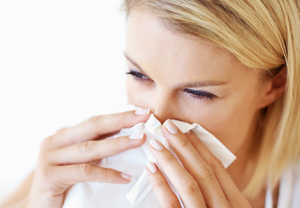
Do You Suffer From Hay Fever?
If your nose can’t stop running, if you are sneezing continuously and have an itchy or stuffy nose, itchy skin, watery eyes or headache, you may have hay fever, or formally called allergic rhinitis. Though it is usually not a serious illness, it makes you tired and hard to concentrate and may affect your sleep. Moreover, if you have asthma, pneumonia, emphysema or other respiratory disease, allergic rhinitis may increase the severity of the symptoms.
What causes Hay Fever?
As the name suggests, “hay fever” originally is a condition triggered in hay harvesting season where pollen becomes abundant in the air. Although the symptoms of hay fever are similar to a cold, it is not caused by a virus or bacteria. Hay fever is an immune response to a substance. Pollen is the main culprit of hay fever in Australia. Many people who migrate to Australia develop hay fever because they are not used to the amount of pollen. Apart from this, other allergens such as fungi, dust mite and cockroach faeces and animal fur are also commonly encountered.
Who Gets Hay Fever?
Hay fever, or allergic rhinitis, affects all ages in both men and women. People with a hypersensitive immune system reacts to allergens that are harmless for the majority of the population. It’s unclear why some people are more prone to a hypersensitive immune system than others. Environment, weather change, genetics are some of the factors that may play a role in this.
Dietary Advice
Foods that are naturally anti-inflammatory may be helpful, like salmon, onions, garlic, turmeric, oranges and lemons. Fresh ginger used in combination with other Chinese herbs that may also help. Drink warm water. The lungs and the stomach favour warm food and drinks. Milk may be a problem because it tends to produce mucus and makes the symptoms worse. Use almond, rice or coconut milk instead.
Acupuncture
Common acupuncture points used for this condition are LI 19, Bi Tong and Yin Tang. They are located on either side of the nose and in between the eyebrows. Fine smooth needles are used for these areas as they tend to be more tender than other parts of the body. Tenderness is usually gone once the needles are in place. Then they are retained in the skin and muscle for at least 20 minutes. Some people will experience a clearing of the blockage during the therapy. Others may find alleviation of symptoms in the next few days. A few sessions are usually required.
Chinese Herbal Medicine
Herbs are often used in conjunction with acupuncture. Some of the common herbs include fresh ginger, dry ginger, Su Ye (苏叶), Gui Zhi (桂枝), Fang Feng (防风)Gan Cao (甘草). Herbs come in several forms. They can be raw herbs that require cooking. Cooked granulated herbs are taken with hot water. Or pills and capsules if you are looking for the convenient option.
Natural Remedies that may reduce symptoms of Hay Fever
- Drink hot water with fresh ginger, lemon and honey.
- Cook with warming spices such as cinnamon, turmeric, cloves, cumin, ginger and fennel.
- Avoid dairy and sweet foods and drinks as they produce mucus causing more blockage.
- Avoid cold foods and drinks as they stagnate circulation.
How long does Hay Fever last?
Unlike a cold which lasts a week or two, hay fever may last as long as allergens are present. It is not life threatening but it causes inconvenience and discomfort.



Leave a Reply